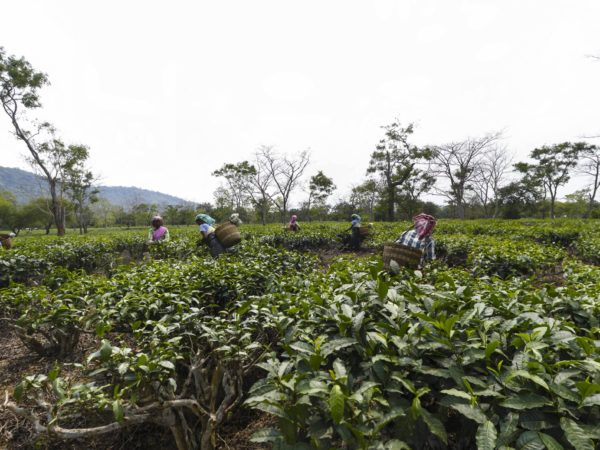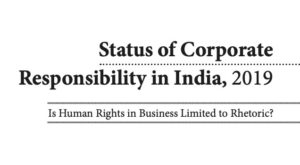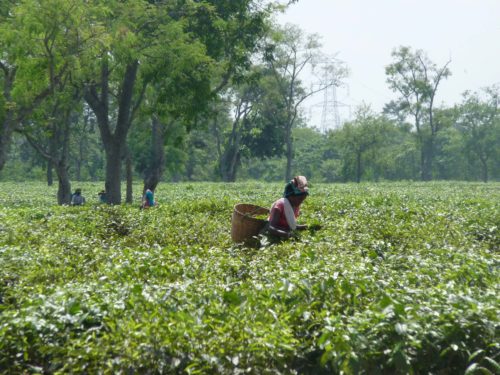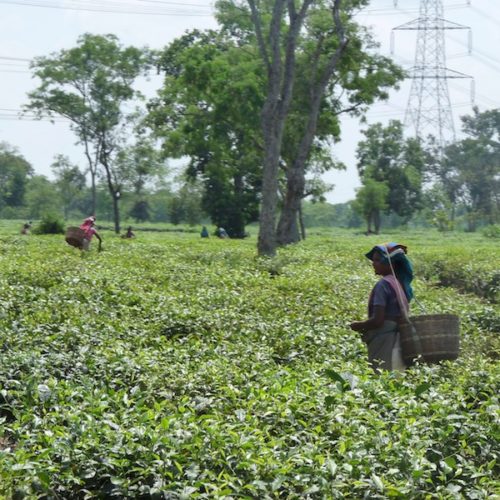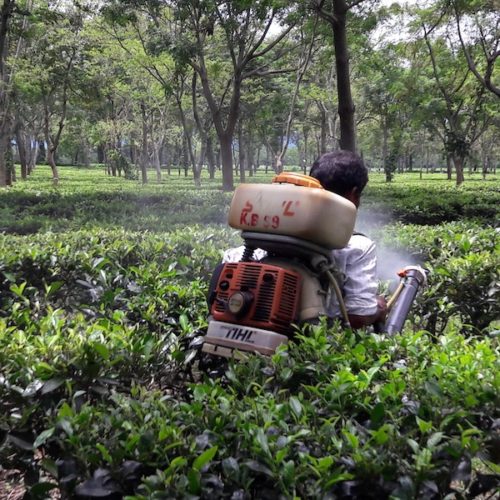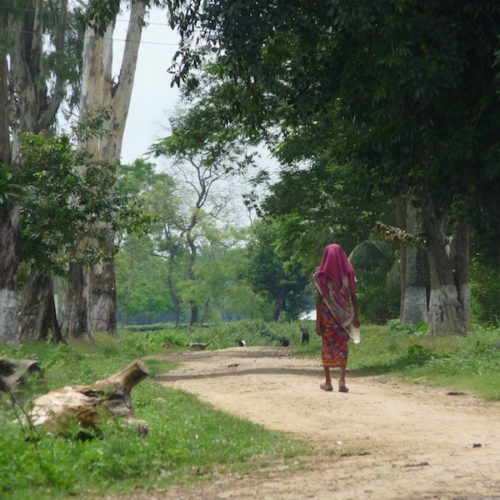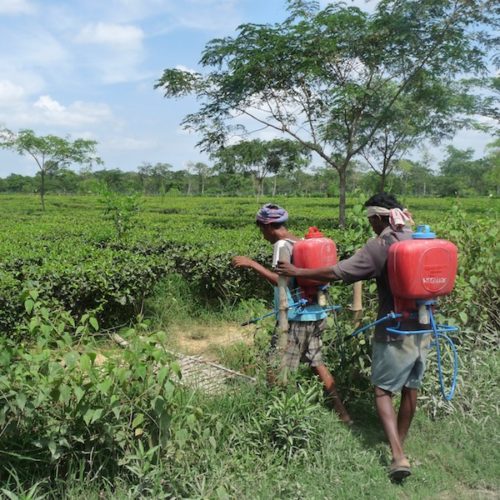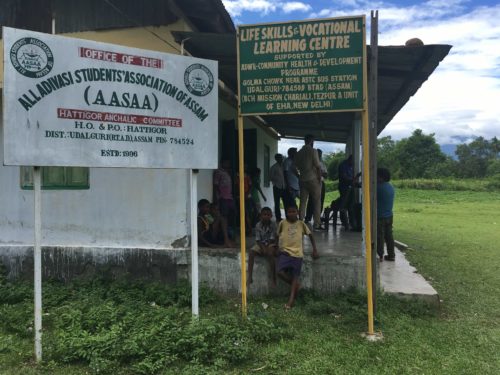India: Assam Tea Plantations
-
Overview
Accountability Counsel and local civil society organizations support tea workers and their families in Assam, India, in their efforts to improve and protect their health, wellbeing, and human rights on tea plantations. The World Bank Group’s International Finance Corporation (IFC) owns 16% of these plantations.
Tea workers in Assam mostly belong to Adivasi or Indigenous communities forcibly brought from central India over 150 years ago under British rule. Ever since, workers have been trapped in a cycle of servitude for generations, depending on their employer for almost every aspect of their lives.
In February 2013, three local civil society organizations – many themselves relatives of tea workers – filed a complaint to the World Bank Group’s Compliance Advisor/Ombudsman (CAO). In this complaint, they raised concerns about inhumane labor and working conditions on three plantations run by Amalgamated Plantations Private Limited (APPL). The plantations are majority owned by the Tata Group (41% by Tata Consumer Products and 25% by Tata Investment Corporation). The complaint cites long working hours, inadequate compensation, poor hygiene and health conditions, coercion and pressure of plantation workers, and lack of freedom of association. All of these conditions violate IFC’s Performance Standards.
The complaint to the CAO also raises concerns about the worker shareholder program. Though the program is intended to provide workers with greater agency in the company, many workers have instead been pressured into buying shares, often without information on what it means to be a shareholder or the risks of investment.
In November 2016, the CAO released a scathing investigation report that found that this shareholder plan had failed as APPL workers were not given proper information about their rights as shareholders. It also found that living and working conditions were substandard and wages were not protecting the health of workers.
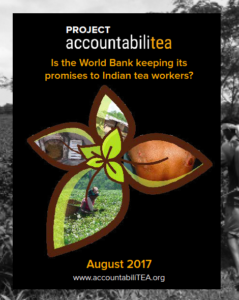
The IFC was supposed to create an action plan that would directly, and in a timely fashion, address the CAO’s findings. Unfortunately, the IFC ignored most of the findings and endorsed a limited action plan that only addresses a small subset of issues.
In July 2017, Accountability Counsel and our partners met with workers from three APPL plantations in Assam to verify whether the limited promises under the action plan were being fulfilled. The exposé – called Project AccountabiliTEA – documents, through photographic evidence, that the IFC had broken its promises yet again.
In January 2019, the CAO released a monitoring report confirming that in the last two years, the IFC has failed to keep their word on promises made following the CAO’s investigation report. The CAO found serious lapses in IFC’s supervision of APPL, including no evidence the IFC followed up with APPL in relation to a series of incidents of death and injury documented by the complainants on three APPL plantations in Assam in 2018. Workers on APPL plantations and their families are continuing to face oppressive living conditions, unfair wages, and the curtailment of fundamental freedoms. The CAO warned that “if noncompliance with IFC requirements persist, IFC, as a part owner of APPL, risks perpetuating a system of employment with well documented negative impacts on workers and their families.”
The IFC issued a letter of response to the CAO Monitoring Report in March, 2019 committing to a facilitated dialogue and sector wide study.
“They do not regularly give protective gear. They only give it when outsiders come – then we are forced to wear it. They specifically ask for it back when outsiders leave.”
– Sprayer, Majuli tea plantation, July 25, 2017
-
The Story
A Long History of Abuse
The workers on many of Assam’s tea plantations were brought to the state from their traditional homeland during British rule. These Adivasi families have thus been working in near total cultural isolation for generations. They are chronically underpaid and subject to working and living conditions that are unsanitary, dangerous, and sometimes deadly.
IFC Investment Into An Abusive Plantation: No Improvement
In 2009, the International Finance Corporation (IFC) invested $7.8 million in a project to establish Amalgamated Plantations Private Limited (APPL), a company that would acquire and manage tea plantations owned by Tata Tea Limited. Tata Consumer Products owns and markets the Tetley brand, making it the second largest player in the global tea market. The project would enable APPL to implement a sustainable “worker-shareholder” model to make shareholding—which is currently dominated by the IFC (16%), Tata Consumer Products (41%), and Tata Investment Corporation (25%)—more available to management and employees. This project was supposed to create more benefits for plantation workers, but the reality has been very different.
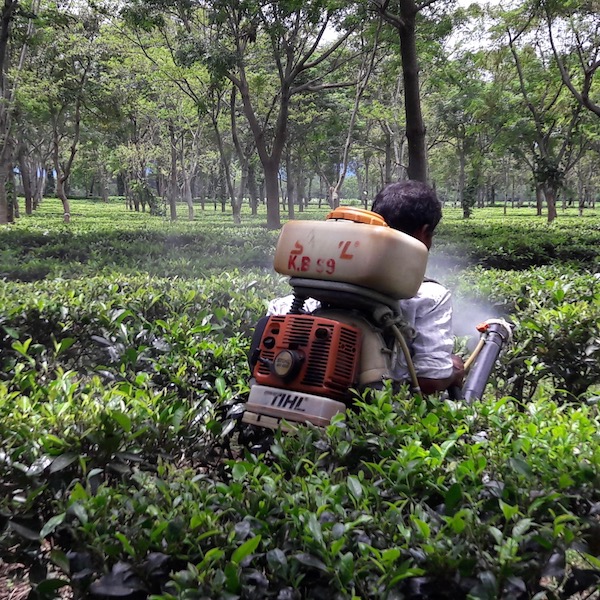
A tea worker sprays pesticides without protective gear on an APPL plantation.
Pregnant Woman Collapses, Worker Dies While Spraying Fields, and People Shot Dead
Several specific incidents of abuse gave rise to demands for justice on the tea gardens. The first incident took place on 9 August 2009 when a pregnant tea garden worker at the Nowera Nuddy estate in West Bengal, who had allegedly made a request for maternity leave at an APPL clinic, collapsed at work in the field. This event led to a labor dispute and a subsequent lock-out that started mid-September of 2009 and lasted a total of three months. The second incident relates to a 25-year-old worker at the Powai estate in Assam who collapsed and died at work on 28 May 2010 after allegedly being assigned to pesticide spraying duties. Later that day, workers protested and clashed with police, leaving two protesters shot dead and at least 18 others injured.
Tea Workers’ Complaint to the IFC’s Accountability Office
In February 2013, three local civil society organizations filed a complaint to the IFC’s Compliance Advisor/Ombudsman (CAO). The complaint raised concerns about inhumane labor and working conditions at three different plantations, specifically citing long working hours, inadequate compensation, poor hygiene and health conditions, coercion and pressure of workers, and a lack of freedom to association, in violation of IFC rules. Furthermore, the complaint raised concerns about the worker-shareholder program. Workers have been pressured into buying shares, often without proper information about the risks of such an investment.
Accountability Counsel’s engagement began shortly thereafter, when the local organizations reached out to us for support with the CAO process.
Retaliation Against Tea Workers for Raising Their Voices, Repressive APPL Demands
In April 2013, the CAO visited Assam and met with workers, civil society groups, and company representatives. The CAO delegation was composed of Andrea Repetto Vargas, the case’s lead CAO dispute resolution specialist, and Ashok Panikkar, a mediator from Meta-Culture in Bangalore, India. In the weeks following the first CAO visit, several workers reported incidents of retaliation and began to fear attending meetings and participating in the process. Civil society groups immediately reported these incidents to the CAO. This led to the CAO facilitating a meeting in July 2013 between civil society groups, complainants, and APPL management to discuss ground rules to finalize the assessment.
In late June and early July 2013, a second CAO delegation, which included Prabha Sankaranarayan, a mediator from Bangalore, and Susana Rodriguez, a CAO associate operations officer, conducted a site visit to finalize the assessment and decide whether to go forward with dispute resolution or compliance review. The CAO delegation met with trade unions, NGOs, workers from several different plantations, student associations from the tea gardens, garden managers, and APPL senior management. They also visited the tea garden worker living quarters. Workers requested additional time to make a decision on whether they wanted to pursue dispute resolution or compliance review. Fear of retaliation played a major role in this decision.
The CAO facilitated a meeting between NGO complainants and APPL management in July 2013 to discuss ground rules to finalize the assessment. Despite workers’ repeated requests to initiate a dispute resolution process, no progress was made on addressing the retaliation against workers on the plantations or reaching an agreement on the role of supporting organizations in a dialogue process. APPL ultimately refused a dispute resolution process where workers were accompanied by their selected representatives — including Accountability Counsel.
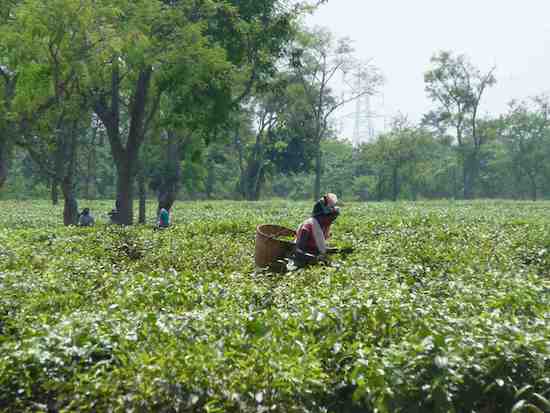
Woman plucks tea in Assam, India. Photo credit: Former AC Law Fellow, Rebecca Gerome.
Demanding Compliance With IFC Rules
In February 2014, Accountability Counsel contributed a supplement to the complaint that outlined the numerous policy and legal violations on the plantations. In late August 2015, the CAO’s compliance review team, represented by a consultant, Patrick Flanagan, visited tea plantations in Assam. In addition to visiting workers’ living quarters, schools, crèches, and hospitals, Flanagan met separately with workers, supporting organizations, and company representatives. Accountability Counsel supported the tea workers and local organizations through the preparation for and during the visit.
In September 2015, Accountability Counsel supported to file additional information outlining the IFC’s failures to meet its due diligence and supervisory obligations, including several enclosures, which are available here.
CAO Investigation and Monitoring Reports Vindicate Tea Workers, Showing Violations of IFC Rules
In November 2016, the CAO released its investigation report. While noting that the IFC’s investment had potential for significant development impact, the CAO’s investigation identifies a number of ways the IFC’s assessment and management of environmental and social risk associated with the investment was not compliant with IFC policy. It found that the IFC’s pre-investment review of the risks was insufficient given the vulnerable status of workers and APPL’s responsibility to provide a range of basic services to them. The CAO also found a number of non-compliance findings in relation to the IFC’s supervision of living and working conditions on the plantations, reported use of banned pesticides, information disclosure, consultation, and response to security incidents. The complainants and their supporting organizations released a campaign website to bring attention to the issues raised in the report.
The IFC has released a public response to the CAO’s investigation report, which is limited in scope and fails to address all the findings.
In January 2019, the CAO released a monitoring report finding that IFC’s supervision since the completion of the CAO investigation report has been unsatisfactory, and that IFC has not delivered on specific commitments included in its response to the CAO investigation. The IFC’s response commits to a facilitated dialogue and sector wide study. For the CAO’s status of the case, please visit the CAO webpage.
Learn more about the CAO accountability office process in this case and our impact.
Case Partners
PAJHRA stands for Promotion and Advancement of Justice, Harmony and Rights of Adivasis. Founded, led, and comprised mostly of Adivasis, or indigenous people of central India, PAJHRA aims to empower Adivasis, promote their rights, and improve their status in North East India.
People’s Action for Development (PAD) seeks to achieve an equal and just society through a participatory approach in the development process, and through empowerment of the Adivasis and rural poor in Assam, India.
Columbia Law School’s Human Rights Clinic and Human Rights Institute supports and influences human rights practice in the United States and throughout the world. As part of their work on Human Rights and the Global Economy, the Institute has investigated conditions at more than a dozen plantations in Assam and West Bengal.
Nazdeek is a human rights organization committed to bringing access to social and economic justice closer to marginalized communities in India. Through on the ground legal support to grassroots organizations, Nazdeek develops strategic litigation and builds community-based networks to increase accountability.
-
The Case
-
Mar 2019
The IFC issued a letter of response to the CAO Monitoring Report.
-
Jan 2019
On January 28, 2019, the CAO released a monitoring report confirming the IFC failed to keep their word on promises made following the CAO’s investigation report. As explained in a joint press release, the monitoring report found serious lapses in IFC’s supervision of APPL, including no evidence the IFC followed up with APPL in relation to a series of incidents of death and injury documented by the complainants in 2018. The CAO warned that “if noncompliance with IFC requirements persist, IFC, as a part owner of APPL, risks perpetuating a system of employment with well documented negative impacts on workers and their families.”
-
Apr 2018
On 27 April 2018 – the ninth anniversary of the IFC’s investment in APPL – Accountability Counsel supported the complainants to submit a letter to the CAO. The letter demonstrated that the IFC has systematically neglected its duties to address the findings reached by the CAO and highlighted a series of deaths and accidents that recently occurred under the IFC’s watch.
-
Nov 2017
Accountability Counsel and partners delivered a petition with more than 67,000 signatures collected by the Care2 social networking website to the IFC. This petition called for the IFC to urgently remedy the situation and ensure that APPL’s tea plantations meet the social and environmental standards required by the IFC Performance Standards.
-
Aug 2017
In August 2017, Accountability Counsel and partners released a report titled Project AccountabiliTEA at a well-attended press conference in Kolkata the day before APPL’s annual meeting. The report drew attention to the fact that the IFC had yet to keep its promises to workers. Using photographic evidence, the exposé reveals that the World Bank had broken its promises yet again. At that point, workers on APPL plantations were continuing to face oppressive living conditions, unfair wages, and the curtailment of fundamental freedoms.
-
Jul 2017
Accountability Counsel and parters met with workers from three APPL plantations in Assam to verify whether the limited promises under “Project Unnati” were being fulfilled.
-
Nov 2016
On 7 November 2016, the CAO released its investigation report on this case. While noting that the IFC’s investment had potential for significant development impact, this report identified a number of non-compliances related to the IFC’s assessment and management of environmental and social risk associated with the investment.
It found that the IFC’s pre-investment review of the risks was insufficient given the vulnerable status of APPL’s workers and the company’s responsibility to provide them with a range of basic services. The CAO also found a number of non-compliance findings in relation to the IFC’s supervision of living and working conditions on the plantations, reported use of banned pesticides, information disclosure, consultation, and response to security incidents.
The IFC released a public response to the CAO’s investigation report that disagreed with many of the findings, as explained in Accountability Counsel and partners’ joint press release.
The IFC was supposed to create an action plan that would directly, and in a timely fashion, address the CAO’s findings. Unfortunately, its response, released alongside the report, was very limited in scope. It largely mirrors an action plan agreed upon by Tata Global Beverages and APPL in response to a Tata-commissioned audit in 2014 conducted by an NGO called Solidaridad. The action plan, known as Project Unnati, had failed to bring meaningful and timely improvements to the workers’ lives. Rather than addressing the root causes of workers’ poverty as highlighted in the report, the plan prioritizes a few actions relating to human health indicators over the next two years, including housing improvements, sanitation facilities, and access to clean water.
-
Sep 2015
Accountability Counsel supported complainants to submit additional information outlining the IFC’s failures to meet due diligence and supervisory obligations. The letter contains several enclosures, which are available here.
-
Aug 2015
The CAO’s compliance review function, represented by a consultant, Patrick Flanagan, visited tea plantations in Assam. In addition to visiting workers’ living quarters, schools, crèches, and hospitals, Flanagan met separately with workers, supporting organizations, and company representatives.
-
Feb 2014
Accountability Counsel supported complainants to submit a supplement to their original complaint, outlining APPL violations of IFC standards, domestic and international law to the CAO in advance of their investigation.
-
Feb 2014
CAO released their appraisal report and terms of reference, authorizing a full investigation into IFC’s environmental and social performance with respect to the APPL investment. According to the terms of reference issued by the CAO, the compliance investigation would consider the following issues:
- Whether IFC exercised due diligence in its review and supervision of the environmental and social risks attached to the project
- Whether IFC policies and procedures provide adequate guidance to staff on how to respond effectively to complaints regarding clients’ environmental and social performance
- Whether IFC policies, procedures and staffing structures as applied to this project provided a robust framework for the advancement of the objectives of the performance standards in its clients
-
Feb 2014
Columbia Law School Institute for Human Rights releases “The More Things Change…”: The World Bank, Tata and Enduring Abuses on India’s Tea Plantations,” an extensive study of labor and human rights violations on APPL plantations. Responses from the IFC and APPL are also available.
-
Nov 2013
CAO completed their assessment report, transferring the case to the compliance function and therefore ending the possibility of dispute resolution under the CAO.
-
Jul 2013
In late June and early July 2013, a second CAO delegation, which included Prabha Sankaranarayan, a mediator from Bangalore, and Susana Rodriguez, a CAO associate operations officer, conducted a site visit to finalize the assessment and decide whether to go forward with dispute resolution or compliance review. The CAO delegation met with trade unions, local groups, workers from several different plantations, student associations from the tea gardens, garden managers, and APPL senior management. They also visited the tea garden worker living quarters. Workers requested additional time to make a decision on whether they wanted to pursue dispute resolution or compliance review. Fear of retaliation played a major role in this decision.
-
Jul 2013
The CAO facilitated a meeting between the complainants and APPL management to discuss ground rules to finalize the CAO’s assessment. At issue were the ground rules that needed to be agreed to finalize the assessment for a dispute resolution process. Despite workers’ repeated requests to initiate a dispute resolution process, no progress was made on addressing retaliation against plantation workers or reaching an agreement on the role of supporting organizations in a dialogue process. APPL ultimately refused a dispute resolution process where workers were accompanied by their selected representatives.
-
Apr 2013
The CAO visited Assam and met with workers, local groups, and company representatives. The CAO delegation was composed of Andrea Repetto Vargas, the case’s lead CAO dispute resolution specialist, and Ashok Panikkar, a mediator from Meta-Culture in Bangalore, India.
In the weeks following the first CAO visit, several workers reported incidents of retaliation and began to fear attending meetings and participating in the process. Local groups immediately reported these incidents to the CAO.
-
Feb 2013
CAO found the complaint eligible for further assessment and an Ombudsman assessment began.
-
Feb 2013
Community organizations, PAJHRA, PAD, and DBSS file a complaint to the World Bank Group’s Compliance Advisor Ombudsman (CAO) on behalf of tea garden workers in Assam, India.
The complaint raises concerns about inhumane labor and working conditions at three different plantations. It specifically cites long working hours, inadequate compensation, poor hygiene and health conditions, coercion and pressure of workers, and a lack of freedom to association. All of these conditions violate IFC Performance Standard 2 (PS2). Furthermore, the complaint raises concerns about the worker-shareholder program. Workers had been pressured into buying shares, often without proper information about the risks of such an investment.
-
Jan 2013
The CAO publishes a compliance appraisal report on a parallel process regarding APPL. The CAO finds that a full audit is merited.
-
Oct 2010
A report titled “In Cold Blood: Death by Poison, Death by Bullets” is published on human rights violations on Tata/Tetley-controlled tea estates in Assam, India.
-
May 2010
A 25-year-old worker at the Powai estate in Assam collapsed and died at work on 28 May 2010 after allegedly being assigned to pesticide spraying duties. Later that day, a protest and a clash with police broke out, resulting in two protesters shot dead and at least 18 others injured.
-
Aug 2009
Setting the stage for tea workers to speak out and demand fair living and working conditions, on 9 August 2009, a pregnant tea garden worker at the Nowera Nuddy estate in West Bengal, who had allegedly made a request for maternity leave at an APPL clinic, collapsed at work in the field. This event led to a labor dispute and later, starting mid-September, 2009, a lock out totaling three months in duration.
-
-
Impact
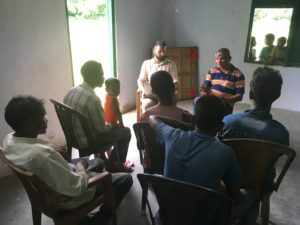 Since 2013, Accountability Counsel has supported local civil society organizations in Assam to amplify the voices of tea workers on plantations who live like modern-day slaves.
Since 2013, Accountability Counsel has supported local civil society organizations in Assam to amplify the voices of tea workers on plantations who live like modern-day slaves.Our work ensured that the IFC’s accountability office, called the Compliance Advisor Ombudsman (CAO), had all the facts needed to demonstrate that the IFC’s investment in APPL violated IFC social and environmental rules.
The impact thus far is a formal record — the CAO’s investigation and monitoring reports — that we are using to push the IFC and the tea plantation owners and operators to act.
Our work has also raised awareness of the inhumane labor and working conditions on the plantations. Following the CAO report, Accountability Counsel’s South Asia team worked with partners in Assam to build a public campaign to garner solidarity for the tea workers, including through press coverage and a campaign website at AccountabiliTEA.org. Our campaign to hold the company accountable received attention in many major domestic and international news outlets, including the New York Times, the BBC, and the Financial Times.
Despite the scathing report from the CAO in 2016 demonstrating numerous violations of IFC policy on the tea plantations in Assam, there has been minimal action by the IFC to address the concerns outlined in the report. We have not been satisfied with this result and our work continued. Our South Asia team worked to create a follow-up report on the tea company’s attempts to downplay the problems on APPL’s plantation.
In August 2017, we released that report with our partners titled “Project AccountabiliTEA” at a well-attended press conference in Kolkata the day before APPL’s annual meeting. This report drew attention to the fact that the IFC had yet to keep its promises to workers.
In November 2017 — a year after the CAO report’s release — we delivered a petition with more than 67,000 signatures collected by the Care2 social networking website to the IFC, calling on the IFC to urgently remedy the situation.
In April 2018, we supported the complainants to submit a letter to the CAO demonstrating that the IFC has systematically neglected its duties to address the findings reached by the CAO and highlighted a series of deaths and accidents that recently occurred under the IFC’s watch.
With the January 2019 monitoring report confirming continued failures by the IFC to provide remedy, we are working towards a fair and credible dialogue process, for workers to have input in improvement measures going forward, and to raise systemic problems with IFC’s role in abuses at the highest levels of the World Bank Group.
-
Case Media
Videos
Press Releases
- 28 January 2019 Press Release: World Bank and Tata Group Must Take Urgent Action to Address Long-Standing Health and Safety Concerns on Their Tea Plantations in India
- 27 April 2018 Nine Years of Neglect: Deaths on Indian Tea Estates under the World Bank’s Watch
- 6 November 2017 Assam Tea Plantations: Advocates Deliver 67,000 Signatures to World Bank Group
- 27 August 2017 At Plantation General Meeting CSOs Call Out World Bank for Broken Promises
- 7 November 2016 Investigation Finds Serious Labour Violations on World Bank Group Owned Tea Plantations in Assam
Blog Posts
- 15 September 2020 Implementing the External Review Requires IFC to Provide Remedy to Assam Tea Workers By Accountability Counsel, PAJHRA, PAD, and Nazdeek
- 30 October 2019 Shifting Risk from the Poor to the Powerful Through Accountability: 2019 World Bank Group Annual Meetings Read Out By Accountability Counsel
- 7 November 2016 Investigation Finds Serious Labour Violations on World Bank Group Owned Tea Plantations in Assam
- 15 June 2016 Accountability Counsel Joins Organizations in Open Letter Calling on Brands to Improve Wages of Tea Workers in Assam
Op-Eds
- 8 April 2020 Indian Tea Plantation Workers Look to the World Bank to Prevent a Coronavirus Disaster By Anirudha Nagar, Accountability Counsel, in The Diplomat
- 11 December 2018 U.K. Companies Can Help Break the Cycle of Poverty Wages on Assam’s Tea Plantations By Anirudha Nagar, Accountability Counsel, in CORE Coalition
- 30 April 2018 The IFC’s worker shareholder failure By Anirudha Nagar, Accountability Counsel, in Livemint
- 13 September 2017 Are Multilateral Development Banks Respecting the Rights of Indigenous Peoples in Development? By Stephanie Amoako, Accountability Counsel, for EarthRights International
- 20 February 2018 Jim Kim’s World Bank is a setup for the poor By Natalie Bridgeman Fields, Accountability Counsel, in Devex
- 29 November 2017 Nimble Fingers, Stifled Voices By Accountability Counsel for the International Labor Rights Forum
- 27 November 2017 From Geneva to Guwahati: demanding fair wages for Assam’s tea workers By Anirudha Nagar, Accountability Counsel, & Jayshree Satput, Nazdeek, in openDemocracy
- 4 October 2016 World Bank investment on Assam’s tea plantations: hearing the voices of workers? By Anirudha Nagar, Accountability Counsel, & Francesca Feruglio, Nazdeek, in openDemocracy
- 27 February 2014 IFC’s bitter tea: Investment in Assam receives global condemnation Komala Ramachandra, Accountability Counsel, & Francesca Feruglio, Nazdeek, in the Bretton Woods Bulletin
Media Coverage
- 2 July 2021 Activists cautiously optimistic about new IFC accountability policy By Shabtai Gold, Devex
- 31 October 2019 Calls for IFC to create ‘remedy fund’ to compensate harmed communities
- 22 October 2019 IFC fails to ensure proper work protection for tea workers in India By Amruta Byatnal, Devex
- 4 October 2019 Corporate Accountability: The Elephant in the Room for Assam’s Tea Industry By Anirudha Nagar, Accountability Counsel, in Status of Corporate Responsibility in India 2019
- 17 June 2019 Advocates welcome IFC reforms, but with some caveats By Sophie Edwards, Devex
- 7 March 2019 U.S. Supreme Court Rules That World Bank Can Be Sued
- 7 February 2019 WB watchdog flays failure to deliver on commitments to tea workers By The Assam Tribune
- 6 February 2019 Pregnant women are risking their lives to bring people tea By Swati Gupta, CNN
- 4 February 2019 IFC failed to ensure workers’ safety at APPL plantations: WB investigator By Kumar Sambhav Shrivastava, Business Standard
- 16 November 2018 British brand Clipper promises slave-free tea By Anuradha Nagaraj, Thomson Reuters Foundation
- 16 May 2018 The World Bank Should Stop Dodging Accountability
- 4 May 2018 Tea garden deaths on the rise in World Bank-funded plantations, claim local NGOs By Tora Agarwala, The Indian Express
- 2 May 2018 Rights Denied In The Name Of Development: The ‘World Bank Approach’ In Assam Tea Gardens By Richu Sanil, Youth Ki Awaaz
- 27 April 2018 Indian workers dying on World Bank-backed tea plantations, say campaigners By Anuradha Nagaraj, Thomson Reuters Foundation News
- 4 January 2018 A critical look at the IFC’s new incentives framework By Emily Gabor, Accountability Counsel, in Devex
- 6 November 2017 World Bank urged to improve lives of Assam’s tea workers By The aPolitical
- 13 September 2017 Labor rights progress under threat across Asia By Humphrey Hawksley, Nikkei Asian Review
- 29 August 2017 Human Rights Activists Want More Workers to Participate in Meeting By the Indian Express
- 15 June 2017 This lawyer helps Mongolian herders and Indian tea farmers fight injustice By Larisa Epatko, PBS News Hour
- 3 April 2017 The World Bank, the Tata Conglomerate and Tea Workers in India By Peter Rosenblum, JSTOR
- 31 January 2017 World Bank continues colonial legacy on Assam’s tea plantations By Simran Sachdev & Jayshree Satpute, Nazdeek, for the Bretton Woods Observer
- 12 November 2016 Indian tea workers’ conditions remain very poor By Justin Rowlatt, BBC News
- 9 November 2016 ‘Assam tea company denying benefits to workers’ By Naresh Mitra, Times of India
- 9 November 2016 World Bank probe into Tata tea project finds it failed to protect Indian workers By Nita Bhalla, Reuters
- 8 November 2016 IFC didn’t follow due process while investing in APPL: World Bank By Vishwanath Nair, Livemint
- 7 November 2016 World Bank, Tata group come under scanner By the Assam Tribune
- 25 October 2016 Where Do Barry’s Tea and Lyons Get Their Tea From? By Lois Kapila & Azera Rahman, Dublin Inquirer
- 11 August 2016 World Bank unit’s wage scandal at Tata tea estates a lesson in due diligence By Yuji Kuronuma, Nikkei Asian Review
- 24 July 2016 Thousands of young mothers in India are paying with their lives to produce your cup of tea By Devjyot Ghoshal, Quartz India
- 15 July 2016 The dark history behind India and the UK’s favourite drink By Justin Rowlatt, BBC News
- 18 May 2016 Assam polls 2016: BJP must win trust before votes to overthrow Congress in tea gardens By Simantik Dowerah, Firstpost
- 18 May 2016 From colonials to corporates: maternal mortality in Assam’s tea gardens By Sukti Dhital & Francesca Feruglio, openDemocracy
- 17 May 2016 Workers launch stir against tea company By the Assam Tribune
- 5 April 2016 Assam: India’s state with the highest maternal mortality By Sophie Cousins, BMJ
- 4 April 2016 Assam polls: Plight of tea garden workers continues despite promises By Furquan Ameen Siddiqui, Hindustan Times
- 27 March 2016 PM Modi ‘Bulldozed’ Rights Of Tea Garden Workers In Assam: Brinda Karat By NDTV
- 7 February 2016 Assam Tea Workers Await Tribal Status As Congress, BJP Fight For Their Vote By Sandeep Phukan, NDTV
- 3 February 2016 AASAA hails wage hike in ATCL gardens By the Assam Tribune
- 22 January 2016 Brewing change in Indian tea By Sudeep Chakravarti, Livemint
- 14 January 2016 UK tea brands drop Indian supplier over work conditions By Jane Deith, BBC News
- 9 November 2015 Ghatowar on minimum wages for tea workers By the Assam Tribune
- 30 September 2015 Spend wisely, ACMS urges workers By Ron Duarah, Assam Tribune
- 18 September 2015 Assam’s Tea Workers Pick The Right Time For a Big Wish By Sandeep Phukan, NDTV
- 8 September 2015 The bitter story behind the UK’s national drink Justin Rowlatt & Jane Deith, BBC News
- 8 September 2015 The Cost of a Cuppa By Jane Deith, BBC Radio
- 9 September 2015 Shocking Conditions for Workers on India’s Tea Plantations Revealed By Rishi Iyengar, TIME
- 24 August 2015 Meet the women fighting corruption and saving mothers’ lives in India By Joshua Carrollm The Guardian
- 13 August 2015 Where Childbirth Can Mean Death By Nikhil Kumar, TIME
- 8 August 2015 Govt move to hike wages annoys tea planters By Naresh Mitra, Times of India
- 4 August 2015 India tea plantation workers denied fair wages and working conditions By TrustLaw in Thomson Reuters Foundation News
- 18 March 2015 Centre likely to amend Plantations Labour Act By the Assam Tribune
- 1 March 2015 Move to challenge CCPA-ACMS wage agreement By the Assam Tribune
- 26 February 2015 TE workers’ daily wage agreement finalised By the Assam Tribune
- 3 March 2014 Angry TATA Global Beverages instructs lawyers over Tetley tea allegations By Ben Bouckley, Beverage Daily
- 1 March 2014 The tea pickers sold into slavery By Gethin Chamberlain, The Guardian
- 1 March 2014 Assam’s modern slaves: the real price of a cup of Tetley tea – video By Gethin Chamberlain, David Niblock, Rodrigo Vazquez, Irene Baqué, Mary Carson, & Maggie O'Kane, The Guardian
- 13 February 2014 Inquiry into Tata Tea Over Labor Issues By Vibhuti Agarwal, Wall Street Journal
- 13 February 2014 Hopes, and Homes, Crumbling on Indian Tea Plantations By Max Bearak, New York Times
- 12 February 2014 ‘Abused workers toil for Tetley tea’ By Dean Nelson, The Telegraph
- 12 February 2014 World Bank to investigate its investment in tea group By Amy Kazmin, Financial Times
- 20 July 2013 How poverty wages for tea pickers fuel India’s trade in child slavery By Gethin Chamberlain, The Guardian
Photos

